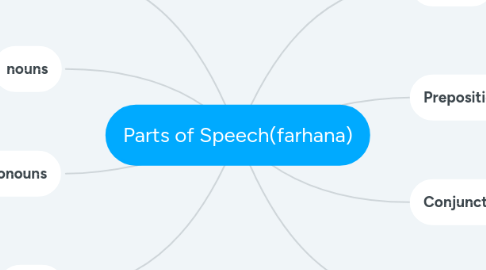
1. Adjectives
1.1. Definition: Words that describe or modify nouns.
1.1.1. Examples: big, happy, blue
1.1.1.1. Explanation: Adjectives provide more detail about nouns. For example, "She has a big house."
2. nouns
2.1. Definition: Words that name people, places, things, or ideas.
2.1.1. Examples: dog, city, happiness
2.1.1.1. Explanation: Nouns are the subjects or objects in a sentence. For example, "The dog is cute."
3. Pronouns
3.1. Definition: Words that replace nouns to avoid repetition.
3.1.1. Examples: he, she, it, they
3.1.1.1. Explanation: Pronouns take the place of nouns. For example, instead of saying "John is here," we say "He is here."
4. Verbs
4.1. Definition: Action words or words that describe a state of being.
4.1.1. Examples: run, eat, speak, is
4.1.1.1. Explanation: Verbs tell what the subject is doing or what state they are in. For example, "She eats lunch."
5. Adverbs
5.1. Definition: Words that describe or modify verbs, adjectives, or other adverbs.
5.1.1. Examples: quickly, very, well
5.1.1.1. Explanation: Adverbs tell how, when, where, or to what degree something happens. For example, "She runs quickly."
6. Prepositions
6.1. Definition: Words that show relationships between other words, often describing location or time.
6.1.1. Examples: in, on, at, under
6.1.1.1. Explanation: Prepositions connect nouns or pronouns to other words in a sentence. For example, "The book is on the table."
7. Conjunctions
7.1. Definition: Words that connect words, phrases, or clauses.
7.1.1. xamples: and, but, or, because
7.1.1.1. Explanation: Conjunctions join ideas in a sentence. For example, "I like tea and coffee."
8. Interjections
8.1. Definition: Words or phrases that express strong emotion or surprise.
8.1.1. Examples: Wow!, Oh!, Hey!
8.1.1.1. Explanation: Interjections are used to express a quick reaction. For example, "Wow! That’s amazing!"
